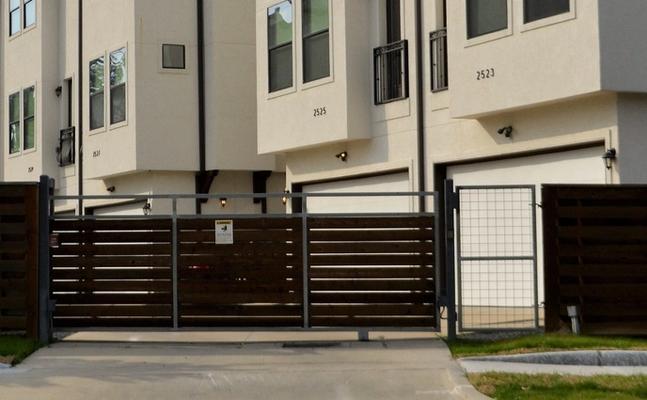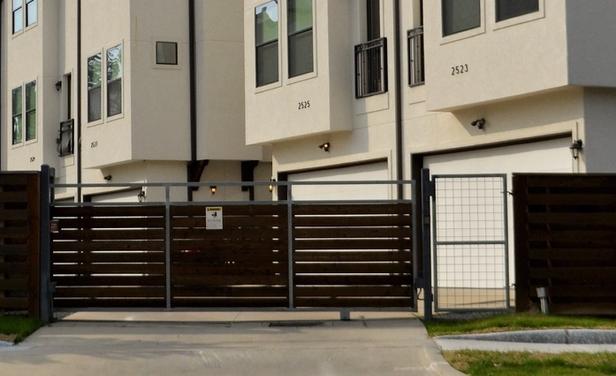Subscribe to our newsletter
Maintaining a safe environment is foremost for homeowners and apartment-dwellers alike, and enhancing safety through residential security gates is a formidable safeguard in keeping unwanted intruders out and sustaining family security within.
Whether you own a home or a multifamily property, there is a security gate that will meet your needs. Here are a few options to secure your driveway and beyond.

Manual (non-electric) security gates
Manual gates are probably the simplest to install and maintain, but by definition, they require physical effort to open and close.
Manual gates work best for low-traffic areas such as securing a residential driveway or a small apartment building, where getting out of a vehicle and opening the gate would not be a safety factor.
These gates can also be constructed from inexpensive materials like chain link or wrought iron.
Pros
Cost-effective
No electricity needed
Reliable
Ease of use and durability
Cons
Inconvenient
Requires manual operation
Manual security gates for homes
Residential properties in low-traffic areas are best suited for manual security gates.
Manual security gates for apartments
Electronic security gates are better suited than manual gates for apartment buildings because they are faster and safer but may also be suitable for smaller complexes.
Automatic (electronic) security gates
An electronic security gate is the way to go if money is not an issue. Automatic security gates are convenient, and if high traffic is a factor, they allow vehicles to enter and exit more efficiently and safely than manual security gates.
Automatic security gates are operated by keypads or remote control and open and close automatically. Electric gates often have additional security features, such as cameras and intercoms.
Pros
Convenience
Added security
Move traffic efficiently
Available in a variety of designs and types
Cons
Cost more than manual gates
Require an electric source
Potential tech issues
Automatic security gates for homes
Automatic security gates add curb appeal, value to a home and convenience for residents.
Automatic security gates for apartments
Electronic security gates are ideal for apartment complexes due to high traffic volume and resident safety.
Folding security gates
Folding security or bi-folding gates consist of two sections that fold open. Imagine a fan closing, and you'll understand how these gates function. Each gate panel folds in half, so they are called bi-folding gates.
A folding security gate works well in smaller spaces and is an excellent option for residential properties such as homes and apartments. These gates are known to be secure and durable and fit the needs of property owners who demand high security.
Bi-folding security gates are easy to operate and work in concert with a variety of access control systems. However, their design makes folding gates open slowly and may not be suitable for high-volume traffic.
Pros
Flexible
Easy to operate
Space efficient
More secure than swing gates
Cons
May require more maintenance because of multiple moving parts
Use restricted to smaller openings
Not suited for high-traffic volume
Folding security gates for homes
Bi-folding security gates are a good choice for private residences because they are aesthetically pleasing, highly secure and fit in limited space.
Folding security gates for apartments
Because of their slow opening process, they may not be a good choice for apartment communities with high traffic volumes.
Sliding security gates
Sliding gates, most common for industrial applications, move horizontally along a track and are excellent for securing wide entrances. Sliding security gates are usually electronic, although gates constructed of lighter materials, such as chain links, can be manually operated.
Electronic sliding gates work well in apartment complexes with high traffic volumes due to their speedy operation. They are also common in private residential applications and condominium communities.
Pros
Suitable for wide spaces
Space efficient
Are more secure
Can be customized for residential applications
Cons
Maintenance costs can be high
Higher installation cost
Sliding security gates for homes
Sliding security gates are available in attractive designs and materials, adding value and security to residential properties.
Sliding security gates for apartments
Sliding gates are the most common security gate for apartment complexes. They provide quick entrance and exit in high-traffic situations.
Swing security gates
Swing gates work well in smaller spaces with narrow drives, such as single-family homes. They are also popular in gated and condominium communities.
These doors open inward or outward like a door and can be manual or electronic. Swing doors add a classic touch to a property and provide tight security and durability.
They are available in a wide range of materials, including aluminum, wood and steel, which provide options for personal taste and every budget.
Pros
Classy look
Strong security
Easy operation
Cons
Requires space behind the gate to swing open
Higher maintenance
Swing gates for homes
Provides security with aesthetic appeal while adding value to the property.
Swing gates for apartments
A swing gate may not be the best option for an apartment complex unless it has a small drive and ample space behind it.
Vertical security gates
Vertical lift gates move up and down along columns within a track to allow or block access. They use a vertical lifting mechanism to rise above the entrance. They are found in both residential and commercial communities where horizontal space is limited.
A vertical pivot gate operates by pivoting vertically to open and close. The gate rotates upwards and downwards around a fixed pivot point.
Unlike swinging and sliding security gates, vertical lift gates offer a unique solution for properties with limited horizontal space.
Pros
Provide high security
Smooth operation
Space saving
Durable
Cons
Requires sufficient vertical clearance to open fully
Maintenance costs may be higher
Higher installation costs
Vertical security gates for homes
Suitable for homes with limited driveway space or areas where traditional gates are impractical.
Vertical security gates for apartments
They are perfect for apartment communities with limited horizontal space or where other gate types might be impractical due to space constraints.
Residential security gate cost and pricing information
Several factors can affect the cost of residential security gates, such as the type of gate, materials used, size, installation complexity and features like automation and security systems. The following is a cost breakdown of the most common security gates for residential applications.
Manual security gates
Cost range: $1,500 to $3,000
Additional costs: Installation costs range from $500 to $1,500.
Electric security gates
Cost range: $3,000 to $12,000 depending on size and complexity.
Additional costs: Installation costs can range from $1,000 to $3,000. Monthly maintenance or service fees for electric components might also apply.
Sliding security gates
Cost range: $4,000 to $10,000
Additional costs: Installation can cost between $1,000 and $3,000, and track maintenance can add ongoing costs.
Swing security gates
Cost range: $2,000 to $7,000
Additional costs: Installation costs range from $800 to $2,500. Ensure there’s enough space for the gate to swing open.
Considerations for selecting the best security gate system for your home or apartment complex
Here are some key considerations for selecting a security gate system that best suits your residential or apartment complex's needs and requirements.
Available space
Horizontal and Vertical Space: Vertical lift gates are suitable for properties with limited horizontal space, while swing or sliding gates require more horizontal clearance.
Material and durability
Material: Choose materials that match your desired durability and aesthetic preferences.
Weather: Your gates should be able to withstand your local weather conditions.
Automation
Electric vs manual: Decide if an electric or manual gate suits your property.
Power: Electric gates offer convenience but require a power source and may have higher maintenance and installation costs.
Cost and budget
Initial cost: Factor in the cost of the gate system and installation. Additional security devices like an access control system can spike costs.
Maintenance: Electronic gates with many moving parts can require more maintenance and possible downtime.
User convenience and safety
Ease of Use: User-friendly security gates are essential for apartment complex residents, visitors and service technicians.
Safety: Seek safety features like sensors to prevent the gate from closing on vehicles or people.

Conclusion
There are various security gate options available for your home or apartment community. Whether you need a manual sliding gate for your home or low-traffic areas or a swift-opening sophisticated electronic gate for your high-traffic apartment community, there’s a solution to fit every need.
When considering your options, remember that a well-chosen gate not only secures your property but also enhances its appeal and value. By carefully considering your unique requirements, available space, aesthetics, safety and user convenience, you can choose a system that provides robust security and service for your home or apartment community for years to come.

